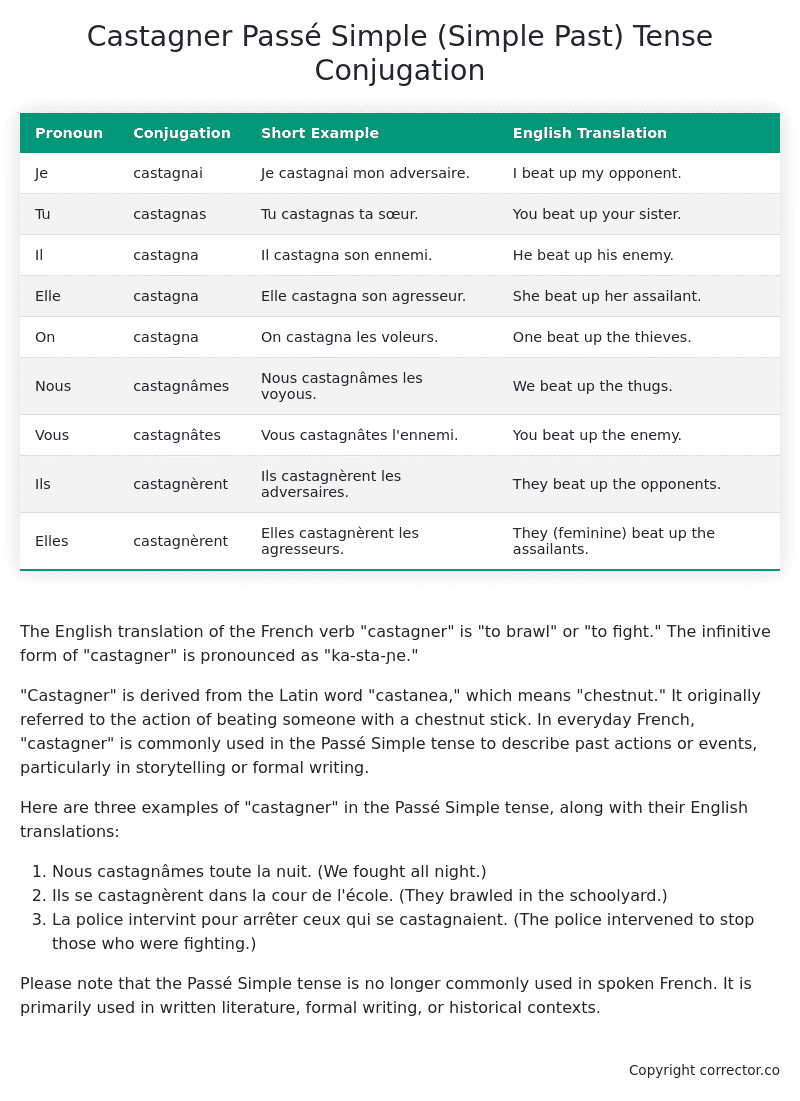Passé Simple (Simple Past) Tense Conjugation of the French Verb castagner
Introduction to the verb castagner
The English translation of the French verb “castagner” is “to brawl” or “to fight.” The infinitive form of “castagner” is pronounced as “ka-sta-ɲe.”
“Castagner” is derived from the Latin word “castanea,” which means “chestnut.” It originally referred to the action of beating someone with a chestnut stick. In everyday French, “castagner” is commonly used in the Passé Simple tense to describe past actions or events, particularly in storytelling or formal writing.
Here are three examples of “castagner” in the Passé Simple tense, along with their English translations:
- Nous castagnâmes toute la nuit. (We fought all night.)
- Ils se castagnèrent dans la cour de l’école. (They brawled in the schoolyard.)
- La police intervint pour arrêter ceux qui se castagnaient. (The police intervened to stop those who were fighting.)
Please note that the Passé Simple tense is no longer commonly used in spoken French. It is primarily used in written literature, formal writing, or historical contexts.
Table of the Passé Simple (Simple Past) Tense Conjugation of castagner
| Pronoun | Conjugation | Short Example | English Translation |
|---|---|---|---|
| Je | castagnai | Je castagnai mon adversaire. | I beat up my opponent. |
| Tu | castagnas | Tu castagnas ta sœur. | You beat up your sister. |
| Il | castagna | Il castagna son ennemi. | He beat up his enemy. |
| Elle | castagna | Elle castagna son agresseur. | She beat up her assailant. |
| On | castagna | On castagna les voleurs. | One beat up the thieves. |
| Nous | castagnâmes | Nous castagnâmes les voyous. | We beat up the thugs. |
| Vous | castagnâtes | Vous castagnâtes l’ennemi. | You beat up the enemy. |
| Ils | castagnèrent | Ils castagnèrent les adversaires. | They beat up the opponents. |
| Elles | castagnèrent | Elles castagnèrent les agresseurs. | They (feminine) beat up the assailants. |
Other Conjugations for Castagner.
Le Present (Present Tense) Conjugation of the French Verb castagner
Imparfait (Imperfect) Tense Conjugation of the French Verb castagner
Passé Simple (Simple Past) Tense Conjugation of the French Verb castagner (You’re reading it right now!)
Passé Composé (Present Perfect) Tense Conjugation of the French Verb castagner
Futur Simple (Simple Future) Tense Conjugation of the French Verb castagner
Futur Proche (Near Future) Tense Conjugation of the French Verb castagner
Plus-que-parfait (Pluperfect) Tense Conjugation of the French Verb castagner
Passé Antérieur (Past Anterior) Tense Conjugation of the French Verb castagner
Futur Antérieur (Future Anterior) Tense Conjugation of the French Verb castagner
Subjonctif Présent (Subjunctive Present) Tense Conjugation of the French Verb castagner
Subjonctif Passé (Subjunctive Past) Tense Conjugation of the French Verb castagner
Subjonctif Imparfait (Subjunctive Imperfect) Tense Conjugation of the French Verb castagner
Subjonctif Plus-que-parfait (Subjunctive Pluperfect) Tense Conjugation of the French Verb castagner
Conditionnel Présent (Conditional Present) Tense Conjugation of the French Verb castagner
Conditionnel Passé (Conditional Past) Tense Conjugation of the French Verb castagner
Conditionnel Passé II (Conditional Past II) Tense Conjugation of the French Verb castagner
L’impératif Présent (Imperative Present) Tense Conjugation of the French Verb castagner
L’impératif Passé (Imperative Past) Tense Conjugation of the French Verb castagner
L’infinitif Présent (Infinitive Present) Tense Conjugation of the French Verb castagner
L’infinitif Passé (Infinitive Past) Tense Conjugation of the French Verb castagner
Le Participe Présent (Present Participle) Tense Conjugation of the French Verb castagner
Le Participe Passé (Past Participle) Tense Conjugation of the French Verb castagner
Struggling with French verbs or the language in general? Why not use our free French Grammar Checker – no registration required!
Get a FREE Download Study Sheet of this Conjugation 🔥
Simply right click the image below, click “save image” and get your free reference for the castagner Passé Simple tense conjugation!

Castagner – About the French Passé Simple (Simple Past) Tense
Formation
Usage
Narration
Historical Context
Interactions with other tenses
Passé Composé
Imparfait
Conditional and Subjunctive
Summary
I hope you enjoyed this article on the verb castagner. Still in a learning mood? Check out another TOTALLY random French verb conjugation!


